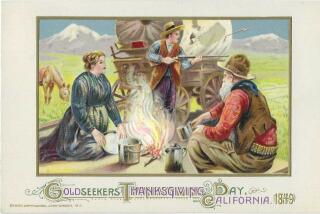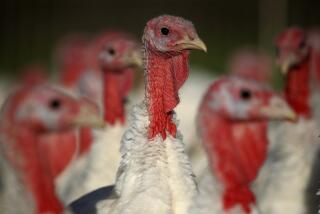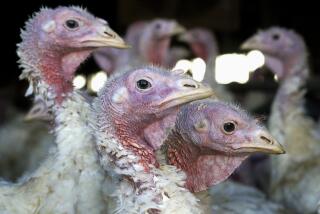‘Natural’ Turkeys Gain Popularity Despite Price
- Share via
The meal is Thanksgiving dinner, the household nutritionally correct.
Toasts are made with Frey rose, a wine pressed from 100% organically grown grapes. Salad greens are purchased with the promise that not a chemical has touched their leaves. The stuffing is Shelton’s Blue Corn Dressing, a concoction of “100% organically grown grains.”
And the turkey is from Willie Bird Turkeys of Petaluma or Shelton’s Poultry Co. of Pomona or even Zacky Farms--any of a growing number of birds making it to the dinner table in their “natural” state.
The U.S. Department of Agriculture prohibits growers and processors from using the word “organic” on poultry and meat packaging. Still, consumers have been flocking to their grocery stores to purchase birds such as Zacky Farms’ young hen turkey, whose label sums up what shoppers want this Thanksgiving: “California Grown Prime Quality. 100% Natural. No Preservatives. No Additives.”
A turkey that fits the USDA definition of natural contains no artificial ingredients and is minimally processed--roasted, ground or smoked rather than bleached and pumped full of basting fluids, said Kathleen Leddy, a food technologist with the USDA’s food safety and inspection service.
At the 334 Vons stores throughout Southern California, meat managers are stocking fresh Butterball, Zacky Farms and Foster Farms turkeys in larger numbers than ever before, said Vickie Sanders, spokeswoman for Vons Cos. Inc. based in El Monte.
“All those turkeys are natural,” Sanders said. “There are no preservatives used in them, no hormones. They’re a little more expensive than frozen turkeys. But they do very well. They’ve only been on the market for the past few years. But they are popular. It’s increasing.”
According to Gil Johnson, director of research for the trade journal Natural Foods Merchandiser, natural poultry and beef is the quickest growing segment of the health food industry.
“Ten years ago, retail sales were $5 million nationally,” Johnson said. “Last year it was $55 million. That’s still not a whole lot, and close to half of it is in California.”
Although there’s no question about demand, Johnson said, there is some concern about getting natural meats into supermarkets, where pricey antibiotic-free turkeys are displayed next to their cheaper cousins.
“Some of the supermarkets aren’t doing as well with natural meats because of the price comparison,” Johnson said.
The California Farm Bureau Federation prices basic frozen turkeys in the 49-cent to 69-cent-a-pound range. Fresh turkeys sell for 75 cents to 89 cents a pound, the federation says. And at Bristol Farms market in South Pasadena, a Shelton Premium Turkey sells for $1.59 a pound.
“Bristol Farms is the Nordstrom of the food industry,” said Bob Welliver, assistant manager in the market’s meat department. “There’s no Butterball or anything like that. This year, the requests for the Shelton have increased 30% to 40% from last year. People around here don’t question the price.”
The owners of Willie Bird Turkeys have increased the number of birds raised and sold every year since the company started in 1963. Demand is so strong today that the company depleted its reserves before the Thanksgiving rush was half over, said general coordinator Joyce Woselowski. The company plans to sell 42,000 birds in the two weeks before Thanksgiving, up from 40,000 in 1988.
“All our stores that order regularly by the first of October increased their orders so much that we had to tap our reserves,” Woselowski said. “We’re running for the first time in many years on no extras to send to the stores. If they don’t have it by now, they won’t get it.”
More to Read
Inside the business of entertainment
The Wide Shot brings you news, analysis and insights on everything from streaming wars to production — and what it all means for the future.
You may occasionally receive promotional content from the Los Angeles Times.











